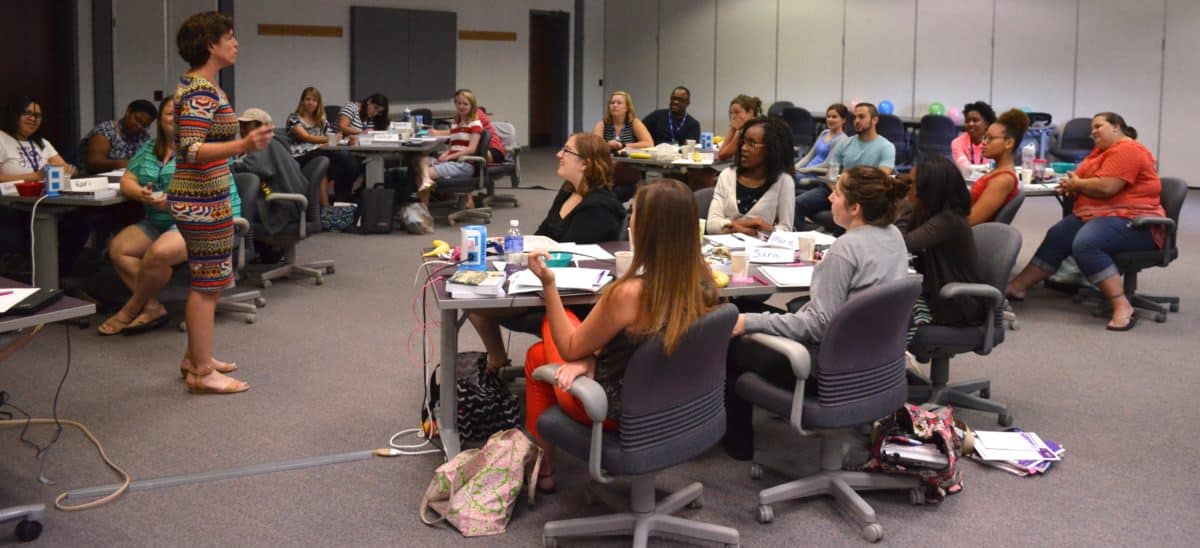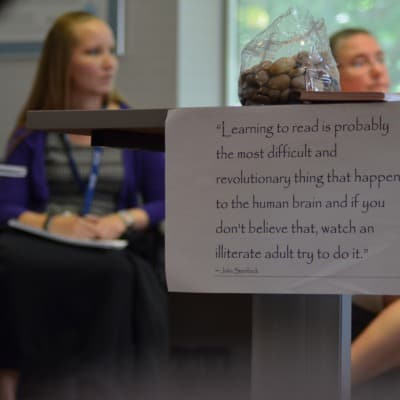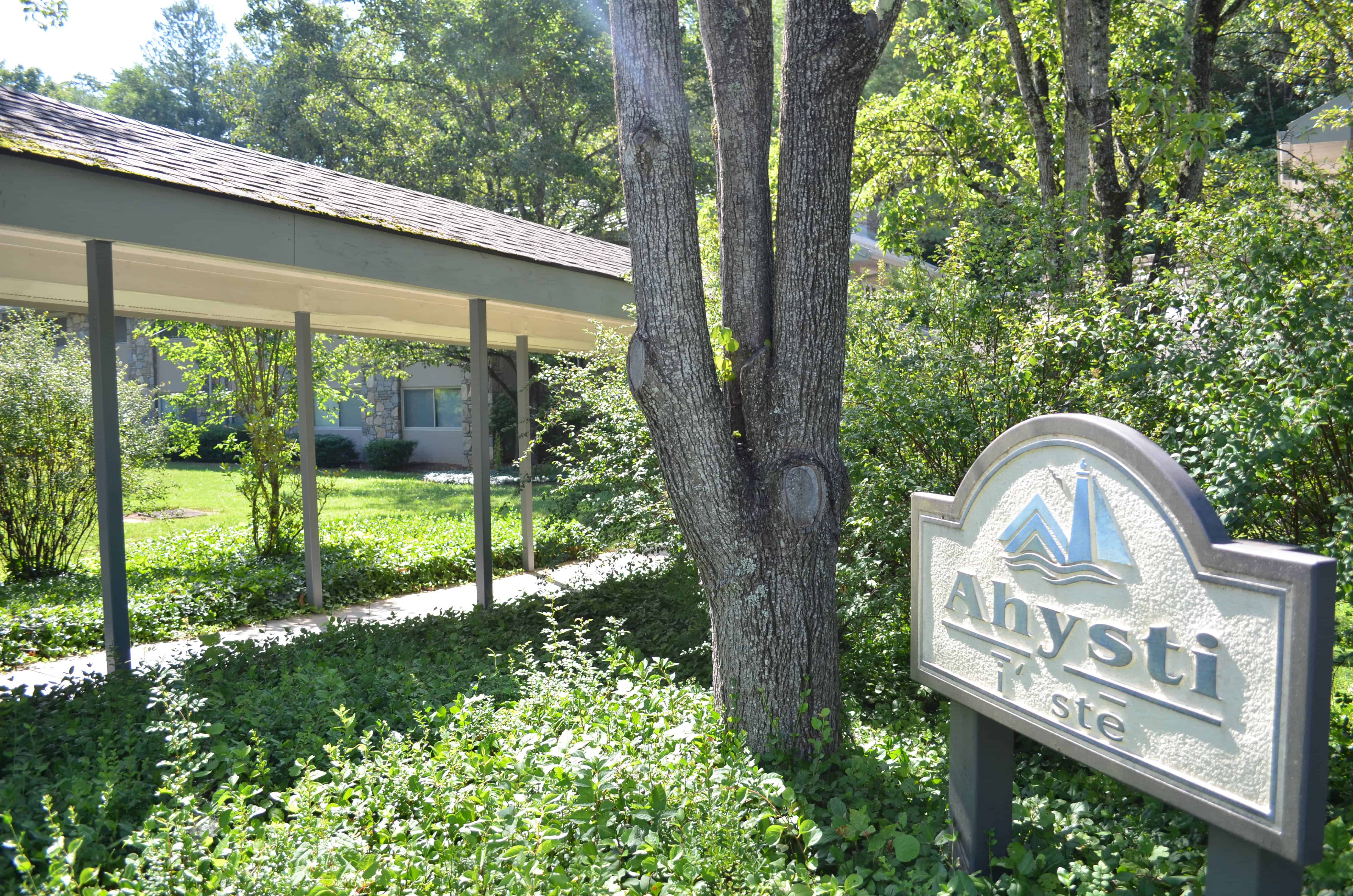Cullowhee in Jackson County was once a winter refuge for the Cherokee, according to Will Putman. Nestled in a valley, Cullowhee gets less snow than some of its surroundings, which would have made it a relatively safe place to settle down and escape from the cold, he said. Now, it’s a different sort of refuge. One where teachers from around the state can stop over and get intensive professional development on a multitude of topics. That’s thanks to the North Carolina Center for the Advancement of Teaching, where Putman works as a business officer.
The Center, known mostly by its acronym NCCAT, takes applications from North Carolina teachers who, when accepted, come to either Cullowhee or NCCAT’s younger location on Ocracoke. Regardless of the location, teachers who attend are in for nearly a week of instruction on specific topics like early grade literacy or how to survive as a beginning teacher.
For Andy Ambrose, a first grade teacher at Pinehurst Elementary School in Moore County, this past July marked his sixth time coming to NCCAT. He was there brushing up on early grade literacy strategies. For him, NCCAT is an essential part of preparing for his next group of kids.
“It just gives me a chance to get away and reflect on my past year and what I can do differently this coming year in my classroom,” he said.
NCCAT’s long history
NCCAT started life in 1985 as part of Western Carolina University — also based in Cullowhee. It erupted from the spark of an idea in the mind of one teacher from Clinton: Jean Powell.
“Jean had a vision that, you know she believes that a good teacher in every classroom is important, and she’s not alone in that,” Putman said. “But she had the idea that helping people learn might happen better if you would kind of remind them of what it was like to learn.”
Putman also said that Powell worried that teachers weren’t being treated like professionals in the same way that, say, a doctor or a lawyer is. She hoped that having a place like NCCAT would help.
“She wanted a place for teachers to go where they could be refreshed, be renewed, feel good about their profession. Maybe touch the stone again that got them into teaching in the first place,” Putman said.
Eventually, NCCAT moved from WCU’s campus to an idyllic 36-acre spot of land, complete with a pond, hiking trails into the hills, and a facility that includes the program’s main conference building as well as two residence halls that can hold about 48 people. NCCAT is now on its own, no longer affiliated with WCU, and gets a little over $3 million annually from the General Assembly. In 2007, the program opened up its Ocracoke location, which can hold about half the teachers as the Cullowhee branch.
How it works
NCCAT holds residential sessions all year that run between four and five days each. Teachers look up the calendar of programs being offered and apply for what they’re interested in. There are multiple sessions being offered in any given week and across the program’s two locations, so teachers might not get their first choice. When they’re matched to a program, away they go. NCCAT is free to attend for teachers. They get food — cooked in house — lodging, materials, and instruction.


The teachers go to sessions throughout the day related to their topic. The sessions might take place in the computer lab or a giant room that can be shrunk or expanded by using partitions. The teachers could also file into the auditorium, a theater equipped with Dolby Audio, where they can see presentations by experts over Skype or watch a movie that reinforces something they learned about earlier in the day.
I walked into one room where beginning teachers —those in their first three years of instruction — were learning some of the biological components that make up their students’ behavior. The instructor walked the teachers through the effects of stress on a student’s body, explaining how it triggers blood sugar to leave the brain and go to the muscles to prepare for a fight-or-flight response. The impact of that on a student is short-term memory loss. Then she explained the healing power of laughter, which both lowers stress and increases dopamine: a chemical that has positive impacts on the growth of neurons in the brain.


Erica Lambert, a first time NCCAT attendee, teaches K-2 students with autism at College Lakes Elementary School in Fayetteville. She came to NCCAT for the early grade literacy program. The tips she got during her week in Cullowhee would help her avoid having to “recreate the wheel,” she said.
“I’ve been working a little harder than smarter,” she said of her time in the classroom prior to NCCAT. “So far, I’ve learned so much information that will make my whole year easier.”
Collaboration
Brock Womble, executive director of NCCAT, said that some of the most valuable learning at his program happens after the day is done and teachers have free time. The opportunity to strategize, commiserate, share, and connect with a group of peers from other parts of the state is one of the most valuable benefits that come from the NCCAT program, he said.
“Everybody talks about how we’re in the digital world and you can talk to anybody anytime,” he said. “You’ve got to know them before you can connect with them.”
And that’s where the residential component of NCCAT comes in.
At the Cullowhee NCCAT location, the teachers are housed in two different buildings: Ata:no and Ahysti. Ata:no means “human spirit” and Ahysti means “place of exploration” in Cherokee. Cherokee linguist Robert Bushyhead gave the buildings their names at a ceremony in 1990. The main conference center got a name, too: Katusi, which means “mountain.”


Forcing teachers to leave their districts behind and come somewhere where they won’t be distracted by family, work, or social obligations, gives them the focus to get the most out of this professional development opportunity, Womble explained.
And as digital technology becomes more and more omnipresent, he said an experience like NCCAT will become even more crucial.
“The opportunity to collaborate face to face is going to be at more of a premium than it was in the past,” he said.
Sabrina Thomas, the teacher from Guilford County, said that face-to-face time is her favorite part of NCCAT.
“What I love here is the networking and sharing ideas,” she said.
And she also said that the residential component makes it unique as a professional development opportunity.
“Because it’s a week long and it’s residential, you can delve into things deeper than you can in a one-day workshop,” she said.
NCCAT does have other components to it as well — programs that staff bring to schools and internet courses, including online resources for its Beginning Teacher Support Program. And sometimes teachers participate in multiple programs that NCCAT has to offer. But it is the residential portion that is the big draw.
“You come here and you’re committed,” Womble said. “You’re committed to this environment, you’re committed to the people around you.”



